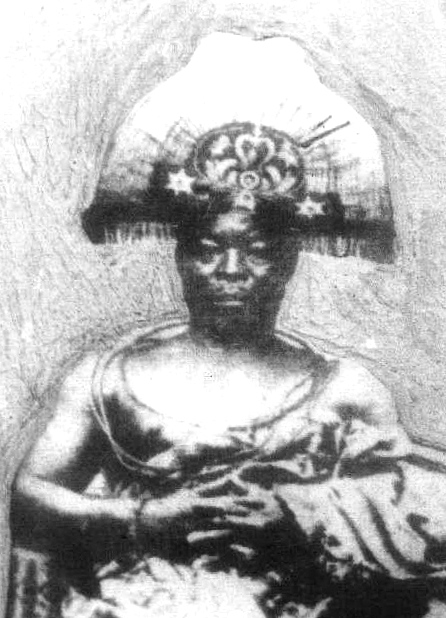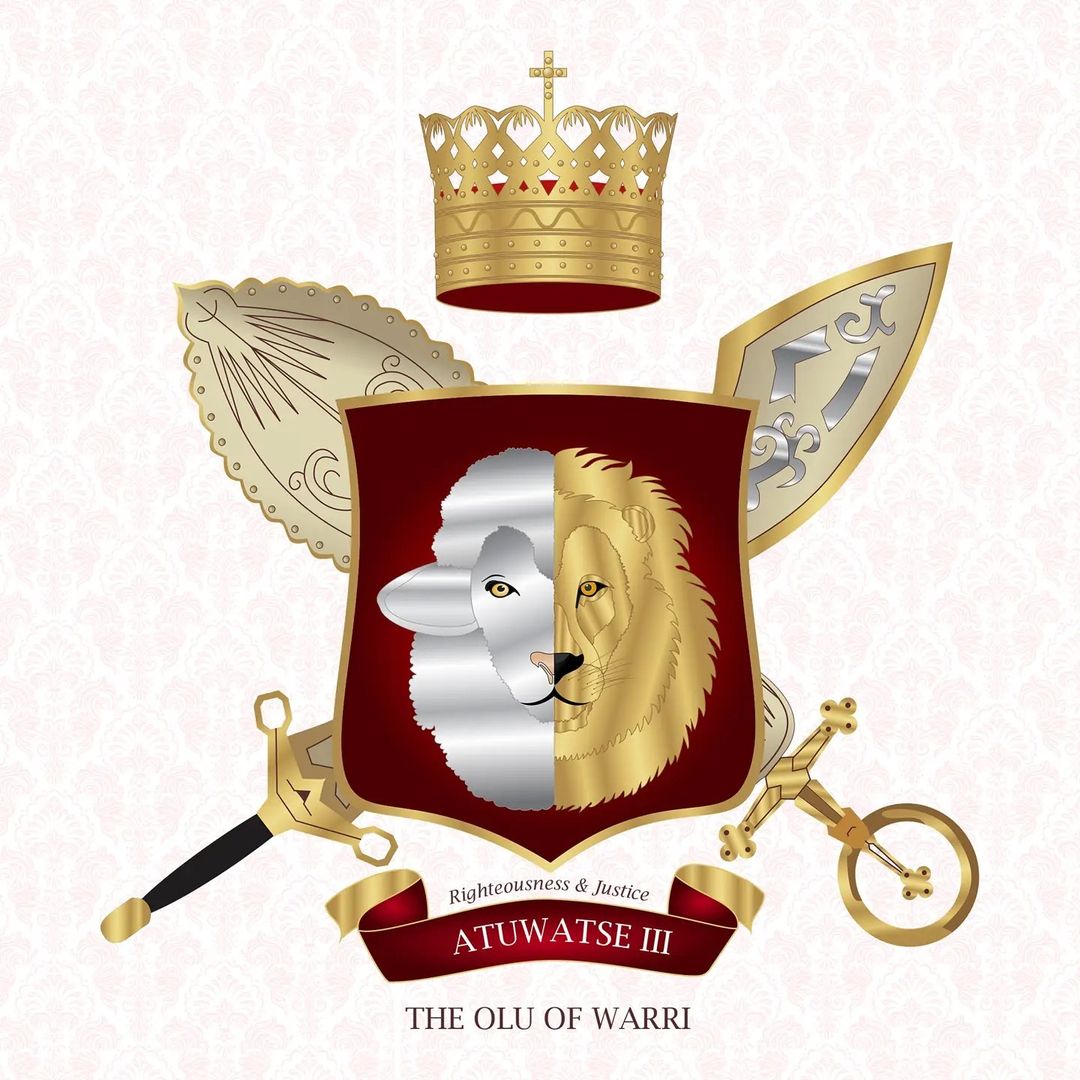|
Oba Olua
Olua was the fourteenth Oba of Benin who reigned from . He was the second child of Ewuare. Olua's reign is noted for his actions and the establishment of the Itsekiri kingdom through his son Iginuwa. Early life and accession Olua was the child of Oba Ewuare and one of his consorts, who was executed by Ewuare for a transgression in the harem. She was denied the funeral rites typically given to the wives of the Oba. When Olua became the Oba, he conducted the final rites for her, despite advice that this could risk his reign. This action led to animosity towards him among the people of Benin. Olua was not Ewuare's firstborn, but was chosen by his father as the successor (Edaiken). According to Benin tradition, the Edaiken was expected to live outside the capital among the hereditary chiefs, but Olua chose not to do so out of fear of his elder brother Okpame. His elder sister, Edeleyo, was asked to rule in his place, but she fell ill and died. The Uzama and Eghaevbo then enacted t ... [...More Info...] [...Related Items...] OR: [Wikipedia] [Google] [Baidu] |
Oba Of Benin
The Oba of Benin is the traditional ruler and the custodian of the culture of the Edo people and all Edoid people. The then Kingdom of Benin (not to be confused with the modern-day and unrelated Republic of Benin, which was then known as Dahomey) has been and continues to be mostly populated by the Edo (also known as Benin ethnic group). In 1897, a British military force, of approximately 1,200 men, under the command of Sir Harry Rawson, mounted the Benin punitive Expedition. The force dispatched in retaliation to the ambush of a British party, at Ugbine village near Gwato, on the 4th January 1897, by a group of Benin soldiers, acting without orders from the Oba; the ambush had led to the deaths of all but two of the British party. The British force captured the capital of the Kingdom of Benin, sacking and burning the city while forcing the Oba of Benin, Ovonramwen, into a six-month exile. The expeditionary force consisted of both indigenous soldiers and British officers b ... [...More Info...] [...Related Items...] OR: [Wikipedia] [Google] [Baidu] |
Ijaw Language
The Izon languages (), otherwise known as the Ịjọ languages, are the languages spoken by the Izon people in southern Nigeria. Classification The Ijo languages were traditionally considered a distinct branch of the Niger–Congo family (perhaps along with Defaka in a group called Ijoid). They are notable for their subject–object–verb basic word order, which is otherwise an unusual feature in Niger–Congo, shared only by such distant potential branches as Mande and Dogon. Like Mande and Dogon, Ijoid lacks even traces of the noun class system considered characteristic of Niger–Congo. This motivated Joseph Greenberg, in his initial classification of Niger–Congo, to describe them as having split early from that family. However, owing to the lack of these features, Linguist Gerrit Dimmendaal doubts their inclusion in Niger–Congo altogether and considers the Ijoid languages to be an independent family. The following internal classification is based on Jenewari (1989) ... [...More Info...] [...Related Items...] OR: [Wikipedia] [Google] [Baidu] |
Itsekiri People
The Itsekiri (also called the Isekiri, ''iJekri'', ''Itsekri'', ''Ishekiri'', or Itsekhiri) are one of the Yoruboid subgroup of Nigeria's Niger Delta area, Delta State. The Itsekiris presently number 2.7 million people and live mainly in the Warri South, Warri North and Warri South West local government districts of Delta State on the Atlantic coast of Nigeria. Significant communities of Itsekiris can be found in parts of Edo and Ondo states and in various other Nigerian cities including Lagos, Benin City, Port Harcourt and Abuja. Many people of Itsekiri descent also reside in the United Kingdom, the United States and Canada. The Itsekiris are closely related to the Yoruba of South Western Nigeria and also close to the Okpe people and Edo peoples. The Itsekiris traditionally refer to their land as the Kingdom of Warri or 'Iwere' as its proper name – which is geographically contiguous to the area covered by the three Warri local government districts. The area is a key centre ... [...More Info...] [...Related Items...] OR: [Wikipedia] [Google] [Baidu] |
People From Benin City
A person ( : people) is a being that has certain capacities or attributes such as reason, morality, consciousness or self-consciousness, and being a part of a culturally established form of social relations such as kinship, ownership of property, or legal responsibility. The defining features of personhood and, consequently, what makes a person count as a person, differ widely among cultures and contexts. In addition to the question of personhood, of what makes a being count as a person to begin with, there are further questions about personal identity and self: both about what makes any particular person that particular person instead of another, and about what makes a person at one time the same person as they were or will be at another time despite any intervening changes. The plural form "people" is often used to refer to an entire nation or ethnic group (as in "a people"), and this was the original meaning of the word; it subsequently acquired its use as a plural form of ... [...More Info...] [...Related Items...] OR: [Wikipedia] [Google] [Baidu] |
15th-century Monarchs In Africa
The 15th century was the century which spans the Julian dates from 1 January 1401 ( MCDI) to 31 December 1500 ( MD). In Europe, the 15th century includes parts of the Late Middle Ages, the Early Renaissance, and the early modern period. Many technological, social and cultural developments of the 15th century can in retrospect be seen as heralding the "European miracle" of the following centuries. The architectural perspective, and the modern fields which are known today as banking and accounting were founded in Italy. The Hundred Years' War ended with a decisive French victory over the English in the Battle of Castillon. Financial troubles in England following the conflict resulted in the Wars of the Roses, a series of dynastic wars for the throne of England. The conflicts ended with the defeat of Richard III by Henry VII at the Battle of Bosworth Field, establishing the Tudor dynasty in the later part of the century. Constantinople, known as the capital of the world an ... [...More Info...] [...Related Items...] OR: [Wikipedia] [Google] [Baidu] |
15th-century Nigerian People
The 15th century was the century which spans the Julian dates from 1 January 1401 ( MCDI) to 31 December 1500 ( MD). In Europe, the 15th century includes parts of the Late Middle Ages, the Early Renaissance, and the early modern period. Many technological, social and cultural developments of the 15th century can in retrospect be seen as heralding the "European miracle" of the following centuries. The architectural perspective, and the modern fields which are known today as banking and accounting were founded in Italy. The Hundred Years' War ended with a decisive French victory over the English in the Battle of Castillon. Financial troubles in England following the conflict resulted in the Wars of the Roses, a series of dynastic wars for the throne of England. The conflicts ended with the defeat of Richard III by Henry VII at the Battle of Bosworth Field, establishing the Tudor dynasty in the later part of the century. Constantinople, known as the capital of the wo ... [...More Info...] [...Related Items...] OR: [Wikipedia] [Google] [Baidu] |
1480 Deaths
*
{{Number disambiguation ...
148 may refer to: *148 (number), a natural number *AD 148, a year in the 2nd century AD *148 BC, a year in the 2nd century BC *148 (album), an album by C418 *148 (Meiktila) Battery Royal Artillery *148 (New Jersey bus) See also * List of highways numbered 148 The following highways are numbered 148: Argentina * National Route 148 (Argentina), National Route 148 Canada * New Brunswick Route 148 * Ontario Highway 148 * Prince Edward Island Route 148 * Quebec Route 148 Costa Rica * National Route 148 ( ... [...More Info...] [...Related Items...] OR: [Wikipedia] [Google] [Baidu] |
Obas Of Benin
Obas may refer to: People * Beethova Obas (born 1964), Haitian musician * Charles Obas, Haitian painter Places * Obas District Obas District is one of eight districts of the province Yarowilca in Peru. Ethnic groups The people in the district are mainly indigenous citizens of Quechua descent. Quechua is the language which the majority of the population (59.11%) learnt ..., Peru Other * OBAs, Optical Brighteing Agents {{dab, surname ... [...More Info...] [...Related Items...] OR: [Wikipedia] [Google] [Baidu] |
Olu Of Warri
The Kingdom of Warri, Warri Kingdom or Iwere Kingdom, (Itsekiri language, Itsekiri: ''Oye Iwere'') was established in 1480, was part of the Nigerian traditional states ancestrally based in Ode-Itsekiri, Warri South, Warri South LGA, Delta State, Nigeria with a palace erected in 1950s in the multi-ethnic city of Warri, Warri South, Warri South LGA, Delta State, Nigeria. The current Olu of Warri is Ogiame Atuwatse III, who was crowned on 21 August 2021. History According to Bini people, Bini and Itsekiri people, Itsekiri histories, Olu Ginuwa, a prince of Benin empire, Benin Kingdom founded the Warri kingdom about 1480. In the 15th century it was visited by Portuguese language, Portuguese missionaries. At the beginning of the 17th century, a son of the reigning Olu was sent to Portugal and returned with a Portuguese wife. Their son Antonio Domingo was Olu of Warri in the 1640s. Olu Erejuwa I, Olu Erejuwa, who reigned from about 1720 to 1800, expanded the kingdom politically an ... [...More Info...] [...Related Items...] OR: [Wikipedia] [Google] [Baidu] |
Ewuare
Ewuare (also Ewuare the Great or Ewuare I) was the Oba (king) of the Benin Empire from 1440 until 1473. Ewuare became king in a violent coup against his brother Uwaifiokun which destroyed much of Benin City. After the war, Ewuare rebuilt much of the city of Benin, reformed political structures in the kingdom, greatly expanded the territory of the kingdom, and fostered the arts and festivals. He left a significant legacy and is often considered the first King of the Kingdom of Benin. Rise to power Prior to Ewuare, the Oba of Benin was limited in their power and authority by the ''uzama'', a group of hereditary chieftains throughout the kingdom. The ''uzama'' were able to appoint the Oba of Benin upon the death of an Oba and could limit any efforts by the Oba. The rise of Ewuare to a position of power is chronicled by Benin's oral history. Ewuare was born as the third son of the Oba Ohen. At this point, Ewuare was known by the name Prince Ogun. Ohen was deposed and stoned t ... [...More Info...] [...Related Items...] OR: [Wikipedia] [Google] [Baidu] |
Ijaw People
The Izon people or Izon Otu, otherwise known as the Ijaw people due to the historic mispronunciation of the name ''Izon'', are an ethnic group majorly found in the Niger Delta in Nigeria, with significant population clusters in Bayelsa, in Delta, and in Rivers. They are also found in other Nigerian states like Ondo, and Edo State. Many are found as migrant fishermen in camps as far west as Sierra Leone and as far east as Gabon. Population figures for the Ijaws are placed at just over 4 million, accounting for 1.8% of the Nigerian population. They have long lived in locations near many sea trade routes, and they were well connected to other areas by trade as early as the 15th century. Language The Ijaws speak nine closely related Niger-Congo languages, all of which belong to the Ijoid branch of the Niger-Congo tree. The primary division between the Ijo languages is that between Eastern Ijo and Western Ijo, the most important of the former group of languages being Izon, which ... [...More Info...] [...Related Items...] OR: [Wikipedia] [Google] [Baidu] |


_1938.jpg)



